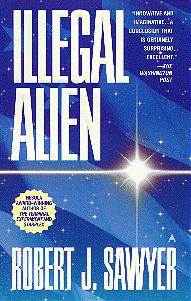Dark Courier

I'm a huge fan of this free TrueType font, provided by Hewlett Packard as an alternative to the spindly Courier New that comes with Windows. Manuscripts are still routinely done in Courier, and this version is much easier on the eyes.
Library Journal on Wake: "Sawyer's erudition, eclecticism, and masterly storytelling make this a choice selection."


I mistakenly said it was yesterday in an earlier post. The deadline is tonight at midnight Pacific time. If you're a Worldcon member, you can vote here. You'll need both your membership number and your voting PIN, which should be on any progress report (or envelope that contained same) for the convention. Your voting PIN is the same as your nominating PIN.
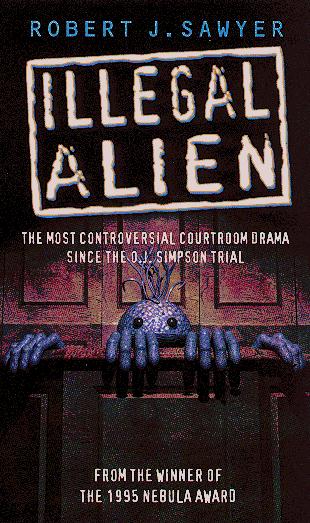



We often hear references in discussions like these (as echoed by the new SF reviewer at the New York Times) about today's SF requiring a degree in physics to understand it. The conclusion often wrongly drawn from that is that, therefore, hard science is what's bogging down SF. I disagree. It's eminently possible to write about hard science -- including quantum physics, string theory, brane theory, nanotech, subtleties of evolutionary theory, and so on -- in an inviting fashion. The nonfiction bookshelves are full of such things: Brian Greene, Stephen Pinker, and recently Seth Lloyd are all doing that to great success.
And the problem isn't infodumps being antithetical to fiction, despite what the MFA-derived workshopping movement wants to tell us. Michael Crichton and Dan Brown have outsold us all by orders of magnitude without ever once worrying about whether the reader will sit still for background information.
Aside: Lou, I almost titled my story "Flashes, " which is in your Futureshocks anthology, "Infodumps" instead, so that I could use that as the title of my next short-story collection -- reach out and tweak the critics right on the nose. But my wife talked me out of it. :)
Rather than infodumps being a problem, I think the real problem in a lot of books is a deliberate attempt to keep out outsiders. It started when we all thought it was cool to co-opt Ursula LeGuin's term ansible for any faster-than-light communication system, but it's gotten way worse than that.
Enormous numbers of SF novels whose plots hinge on nanotech or quantum physics fail to make the needed background self-contained in the book, and therefore exclude readers. Fantasy has to include all needed background in the book; perhaps to survive, science fiction should do this (with wit and charm and elegance, of course).
Instead, SF has become the leetspeak of pop literature: we like the outsider/misfit/subculture label, and set up linguistic barriers to keep newcomers out. Woot! $(13|\|(3 ph!xo|\| 12|_|73z! [Science fiction rules -- and maybe it does, but it's a pyrrhic victory if no outsider can read it. TANSTAAFL, and all that.]
For my own part, I've bet my career on trying to write accessible SF -- stuff that can be read with pleasure both by those who are intimately familiar with the genre and by people who've never read it before. You were there last month, Lou, when I won the John W. Campbell Memorial Award for best novel of the year -- and I was thrilled to get it, as I was thrilled to get the Hugo and the Nebula before that. But in all my career, the following are the two honors that mean the most to me, and they're what I call juxtapositional honors:
First, I was thrilled that my 2000 novel Calculating God hit number one on the Locus bestsellers' list -- meaning it was doing well with habitual SF readers who shop at the SF specialty stores that provide the bulk of the datapoints for that list -- and that Calculating God hit the national top-ten mainstream bestsellers lists here in Canada (in Maclean's: Canada's Weekly Newsmagazine and The Globe and Mail: Canada's National Newspaper) -- meaning that it was being scooped up by people who don't traditionally read SF.
Second, I was thrilled that last year, my Hominids was chosen as the "One Book, One Community" reading selection for a Waterloo Region in Ontario, Canada, and was warmly embraced by huge numbers of readers who'd never read SF before, and that Hominids was serialized in Analog, the bastion of hard-SF. You can appeal to the core SF readership and the mainstream audience -- it isn't an either/or proposition.
Note that none of this requires downplaying the term "science fiction" -- I make no bones about who I am and what I write.
Some of my British colleagues have similar experiences with both mainstream and genre acceptance, but not nearly enough American authors -- or publishers -- are even making a token effort to try for it.
It is possible to cater to both audiences with the same work, but it takes an understanding that this is what's being undertaken not just by the author but by the publisher as well. Yes, call it science fiction, but don't put an alien or a spaceship on the cover. I personally happen to like Robert Charles Wilson's Blind Lake better than his Spin -- although both are excellent, and both could easily be read by non-habitual SF readers -- but Blind Lake didn't get nearly as much notice, or, I'd wager, as many sales, because it has, literally, a bug-eyed monster on the cover (see above), whereas Spin has a very mainstream look, and was reviewed widely in and out of genre. Or look at Charles Stross's Accelerando (US edition) -- wonderful packaging that works both in and out of category.
Again, I'm not urging people to escape the SF category; rather I'm urging more at least try to do that tricky walk along the top of the fence around the category. Because it's only by making new readers feel comfortable in our field that SF will survive.
I was asked the above question a couple of years ago by a guy writing a book with practical advice for unusual situations. I never heard back from him, and don't know what happened to the book, but here's my answer:
What to do if an alien shows up in your living room:
First, in the time-honored words of The Hitchhiker’s Guide to the Galaxy, "Don’t panic."
The alien standing in front of you evolved somewhere other than here. That means its biochemistry isn’t like that of earthly organisms -- so you don’t have to worry about being eaten; it could no more digest you than you could digest sand.
Also, it’s far less likely that an alien would find you sexually attractive than it is that you’d get turned on by the sight of a squid. Indeed, you’re probably the butt-ugliest thing this alien has ever seen -- so there’s no need to worry about guarding your virtue.
Finally, remember that it takes a large amount of energy to move between worlds, and energy costs money, everywhere in the universe. There’s no material object or natural resource on Earth that it wouldn’t be cheaper for the alien to synthesize at home rather than come here to get. The only reason for traveling between worlds is to access the immaterial: other cultures, other points of view, other forms of art.
So, relax, put on a good CD, and calmly set about trying to communicate. The alien might not use spoken language -- it could rely on sign language, shifting patterns of skin coloration, or any of countless other methods. But the fact that it came here when we don’t have the technology to go to its world means it has greater technology than we do. The alien doubtless has a small computer on its person, which will observe what you’re doing and figure out how to translate between your spoken words and the alien’s language.
Build up a vocabulary of nouns and verbs by pointing at things and demonstrating actions while saying the appropriate words aloud. Be polite and be patient -- although it’s true that the alien is the one in a foreign land, you are the goodwill ambassador for all of us. Do us proud.
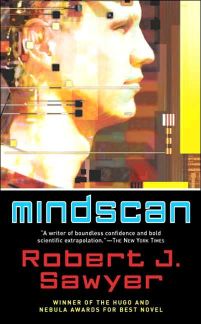
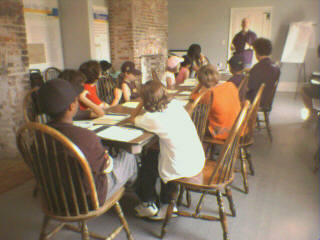
So, the wonderful Chris from Bakka-Phoenix, Toronto's science fiction bookstore, called today with a classic good-news/bad-news bit.
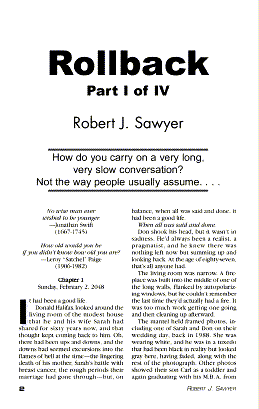
I haven't seen it yet myself, but it's been reported in my Yahoo! Groups newsgroup that the October 2006 issue of Analog, which contains part one of my serialized novel Rollback, is now out on newsstands, at least in Ohio. Woohoo!
... when you make money without working. :)
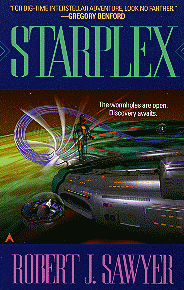
Well, given all the discussion between me an Evo Terra about new publishing and distribution paradigms here and here and here this past week, my choice for this week's Monday Spotlight, highlighting one of the 500+ documents on my website at sfwriter.com, is this piece I wrote in 1998 about "Print on Demand."
I'm not the only one who likes playing with the concept of parallel universes. Saturday Night Live did it recently, with special guest star Al Gore giving his state-of-the-union address in the alternate quantum reality in which he is president. I was lucky enough to catch this live when it was first broadcast, and it's now online here -- click on "New Videos," then "Parallel Universe."

Evo Terra answers some of the questions I raised in this posting, but not as a comment to that post; rather, his response is in his comments to an earlier posting by me, in which he says: "6 of the 58 titles [at Podiobooks.com] have (or have had) over 2000 subscribers. 17 are over 1000."



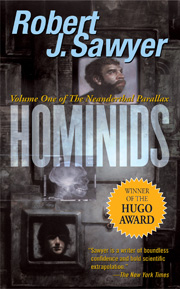
In response to another posting of mine on this blog, Evo Terra of Podiobooks.com and the Dragon Page responded to my comment that online serialization of a first SF novel would probably get the author fewer than 100 readers; in his posting here he says that's not true -- thousands of readers can be reasonably expected. He's also put a different version of his comment (lowering his claimed number to just 1,000 readers in the process) on the Dragon Page, and there brings up the writers John Salzi and Cory Doctorow, both of whom I admire greatly, as examples to prove his point. Have a look at what Evo said, then come back here for my response to him:
I happened to stumble across this particular installment of the week's news from Science Fiction Weekly, dated from April 21, 1997 (scroll down past the long piece on the Nebula winners to see the week's news). Fascinating to read of the things that we were told were on their way to theatres back then, including:
Ringworld coming to the big screen
Ringworld, the popular SF adventure trilogy by Larry Niven, is being developed into a feature film by QDE Entertainment, the production company of music producer Quincy Jones, Daily Variety reports.
The Ringworld books tell the story of a massive artificial ring, as large as the Earth's orbit around the sun, discovered in deep space by a band of alien and human adventurers, and the efforts of the discoverers to unravel the mystery of the ring's builders.
The film should have a built-in audience: the Ringworld trilogy has more than 7 million copies in print. -- P.L.
Superman to get Dark Knight treatment
Wire-haired director Tim Burton, who did much to transform Batman from camp buffoon to Dark Knight, may be in the works to do the same to that All-American icon, Superman, according to The Hollywood Reporter.
Burton (Ed Wood) is reportedly in talks to take the helm of Superman Reborn, a new, darker take on the story of Our Man from Krypton. Nicolas Cage (The Rock) is expected to don the Man of Steel's new tights (no cape this time around).
Evean as word of Burton's involvement came out, the film's writer Kevin Smith (Chasing Amy, Clerks) was quoted blasting the film's studio, Warner Bros., in a story in Buzz Weekly. Smith later said he didn't recall making the comments to Buzz, according to The Hollywood Reporter. "When I say 'anxious motherf---kers,' it doesn't mean I don't like the guys," he told the trade paper. "They were nice enough to tap me to write."
Burton -- reportedly unsatisfied with Smith's script -- has already approached at least two major screenwriters, Akiva Goldsman and David Koepp (Jurassic Park), to submit new versions, according to the trade paper. -- P.L.

Got asked today by a new author for advice on promoting a first fantasy novel. Here's what I had to say:
For starters, you should have a look at the promotion stuff on my website, particularly this 37-minute podcast.
You should also read this article by me on getting good press, and this one by me on self-promotion for writers.
You asked about awards in the field. Here's a comprehensive list.
And you asked which conventions to attend. Since you're in Florida, I'd certainly recommend the International Conference on the Fantastic in the Arts, and I also highly recommend the World Fantasy Convention.
Best of luck!
For those who live in the same city as me -- Mississauga, Ontario (pop: 650,000, abutting the west border of Toronto) -- there's an article about me entitled "Science fiction writer picks up award," with the subtitle "Lone Canadian to win field's top awards" on the front page of the Lifestyles section of the Mississauga News. The article is by Julia Le, and is based on an interview we did by phone while I was at Odyssey last week.

I'm thrilled to announce I've sold a second novel to DAW Books, via my agent, Ethan Ellenberg, for publication in (probably) 2007. The as-yet untitled book will be a stand-alone science fiction novel, not a sequel to my science fiction novel Lost in Translation, which DAW is bringing out in mass-market paperback this October. (A Lost in Translation sequel remains a possibility for the future.)
It's not often I know the precise date when a story or novel was born, but I do in this case: it was born on September 20, 2005, during the Writing With Style workshop on writing speculative fiction taught by Robert J. Sawyer at the Banff School of Fine Arts. That morning I and fellow workshoppers were asked to write, as a classroom exercise, the opening lines of a story. The opening line I wrote became an unfinished short story which in turn became the basis of the synopsis that sold the new novel to DAW.
I had a fabulous time teaching at the Odyssey workshop last week. Part of my job was giving daily lectures on various aspects of writing. The first one I did was on point of view, which had also been the topic of one of my old "On Writing" columns for On Spec magazine. I offer that particular column as this week's Monday Spotlight, highlighting one of the 500+ articles on my website at sfwriter.com
... which is something I never enjoy doing. The author wanted me to make up my mind about a submission to Robert J. Sawyer Books, because he/she had interest from a PoD publisher, and a web site had expressed interest in serializing the book. And so I did make up my mind. Here's what I had to say, since it might be helpful to others out there:
This is the second follow-up you've sent since submitting your novel less than three months ago.
I've read a good hunk of your book and like it on a stylistic level; I'm not 100% sure it's fresh enough in terms of content for me, and have been trying to find the time to read more of it.
I will say this: very few traditional print publishers move really fast in making decisions. I've been moving way faster than, say, Tor or DAW, would have; there, it's often over a year before anyone even opens your envelope, and usually at least two years after a first novel is bought before it's on the bookstore shelves.
The reason online/POD places can reply so quickly is that they're risking almost nothing; production and distribution costs on a book going into bookstores will run to tens of thousands of dollars, and so such decisions have to be made with care. If you want immediate short-term gratification, you're in the wrong field.
I'll also say this: repeatedly forcing an editor to focus his or her thoughts on your work by asking if a determination has been made yet may lead the editor to make decisions prematurely, and there's only one safe decision to be made that way. Since you want a decision now, here it is: I'm going to pass on your book.
As you yourself have just pointed out to me, I'm having no trouble getting submissions from established, bankable names such as Matt Hughes and Phyllis Gotlieb (not to mention Karl Schroeder), and although I am proud to have already brought a couple of first novels to market, they are harder work for the editor, harder sells for the sales force, and earn less money for the publisher; I fight to make them possible in a very competitive marketplace, but I can't do it without careful deliberation.
So, best of luck elsewhere. All that said, though, one writer to another, I think going the route of online serialization and POD are mistakes you will regret in the years to come. Online publishing and POD are a waste of time; you'll have fewer than a hundred readers, I'm willing to wager, in either format. But it's up to you.
All best wishes.
Rob
If you're reading my blog because you knew me back in the late 1970s when I was a student at Northview Heights Secondary School (previously known as Northview Heights Collegiate Institute) in Willowdale / North York / Toronto, please note that the school is having a reunion Friday, May 4, and Saturday, May 5, 2007, in honour of the building's 50th anniversary. I'll certainly be attending. You can find more information here.
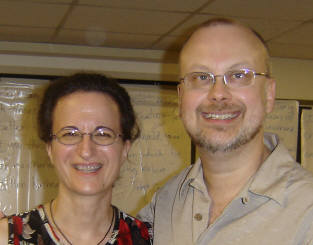
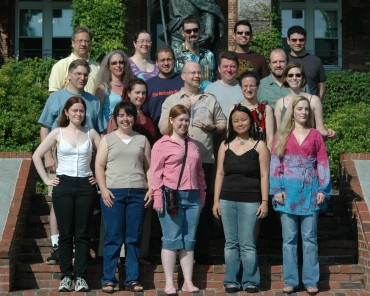
I'm back home after nine days on the road, and finally have a chance to properly update my blog. This entry is about the Campbell Conference, held July 5-9, 2006, at the J. Wayne and Elsie M. Gunn Center for the Study of Science Fiction at the University of Kansas.
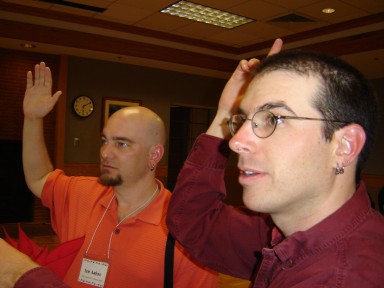
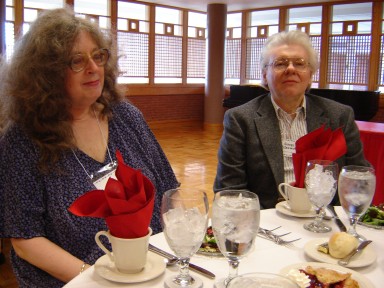
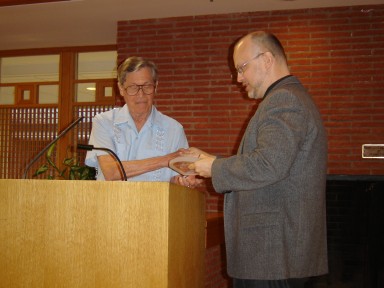
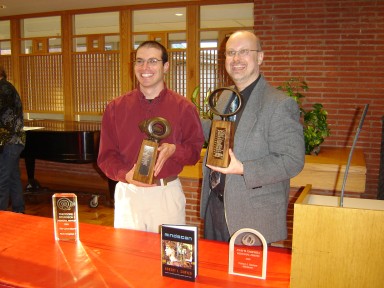
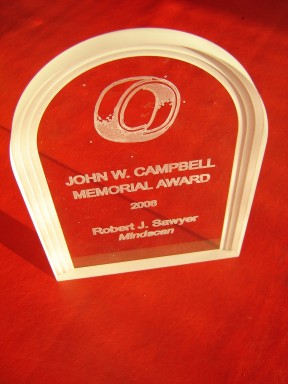
From the publishers of Talebones, one of the best magazines in our field:
Dear Family, Friends, Peers, Acquaintances:
Talebones has been a part of our lives for almost 11 years now. We have enjoyed every minute of putting all 33 issues together for our readers. It has truly been a labor of love. Most of the time that labor has cost us money, and now, because the amount of money we can put into the magazine has dwindled and, for whatever reason, subscriptions and renewals have not been as strong as we had hoped over the past year, we figure we may have to close down the magazine.
A couple of days ago, it was actually a final decision. “That’s it, there’s no way can we keep going.” There were tears. A few VIPs we mentioned it to asked us to reconsider. So we took a step back and decided: We will issue renewal notices as usual, but put an extra strong plea in there about this. And then we will send a more detailed email to everyone in our email address book who might have an interest. Based on what renewals come in over the next month, based on the response to this email, we will see if Talebones can continue on past 2006. Issue #33 is already in its final preparation stage. With our decision to make this final stab at keeping things going came the decision to at least have an issue #34, to be published in November of December. We will make a determination then if it is to be the last or not.
If you’ve subscribed to our magazine before, if you’ve never subscribed, but maybe sent us stories (or had stories published by us), or have wished us well with our little venture, we hope you’ll consider helping out. (We didn’t go through our files to know which of you are current subscribers and pull you off this email list, so forgive us if you’re already subscribers in good standing. If nothing else, we wanted you to know what was up.) At this point, even a single issue copy of our upcoming issue #33 will help. (We’ve put the order form/info up on our website early.) We have Paypal ready to go if you’d like to go that route. Or you can send money order or check payable to Talebones to our physical address at 5203 Quincy Ave SE; Auburn, WA 98092. Or you can ignore this, delete this, or, do whatever you like. It won’t change the way we feel about ANY of you. We just thought we’d do something we’ve never done in over a decade of publishing the magazine: beg!
That’s our sermon. Thanks for your support. Regardless of what happens to the magazine, never fear: Talebones and Fairwood Press will continue to have a presence in the SF world.
Patrick & Honna Swenson
www.talebones.com
For today's Monday Spotlight, highlighting one of the hundreds of articles on my website at sfwriter.com, I offer up this guide to award-winning Canadian Science Fiction, updated to include this year's Aurora winners.
Lots of nice press coverage about my John W. Campbell Memorial Award win:
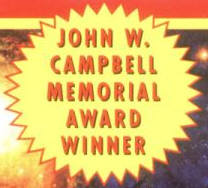


Robert J. Sawyer, as you've probably noticed by now, has a way of taking familiar ideas, looking at them from new angles and in greater depth than almost anybody before him, and tying them together to create extraordinarily fresh and thought-provoking stories. The latest example is his novel Rollback, which we'll be serializing in four parts beginning in our next issue (October).
We've all seen lots of stories about rejuvenation and lots of stories about the search for extraterrestrial intelligence, but how often have you thought about how the two might be connected? Well, consider these questions: Who could maintain interest in a very long, slow conversation long enough to go anywhere with it? What would be worth talking about under such conditions? If rejuvenation is very, very expensive, as it probably will be at least initially, what would motivate anybody to pay for it? What would it really be like -- and what if it doesn't work the same for everybody?
Sawyer's answers to those questions, and the many others they stir up, will guarantee you a thoroughly engaging story, and acquaintance with some of the most memorable people you'll ever meet.

The development of the court case is fascinating (including both the exploration of individuation and lawyers taking issue with the fact that the androids don't dream), as well as the very human reactions of all versions of these people, in their original and artificial forms. Mindscan is Robert Sawyer's best yet, SF that explores an issue that may not be all that far ahead of us, by developing all kinds of intriguing human implications. Don't miss this one.


Just got word that Ad Astra, Toronto's general SF convention, has set its 2007 dates: it will be March 2-4, 2007. Mark your calendars! We'll be launching Phyllis Gotlieb's new book there.
